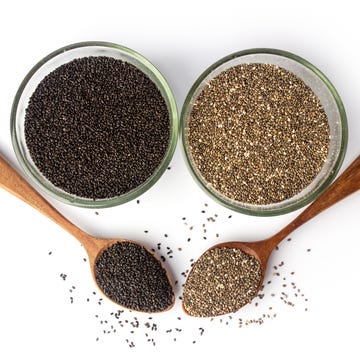Matcha
 orinoco-art//Getty Images
orinoco-art//Getty ImagesMatcha belongs to the green tea family, but it's used as a concentrated powder instead of dried leaves. This makes matcha higher in caffeine and an amino acid called L-theanine, a compound linked to feelings of focus, alertness, and sustained energy. Sometimes the benefits of matcha get conflated with weight-loss claims, so a word to the wise: The only real way matcha will help you lose weight is by drinking it in place of soda, juice, and energy drinks. Sugar-sweetened drinks are the #1 source of added calories in the American diet, so plain matcha is a smart swap.
RELATED: 7 Health Benefits of Matcha You Should Know
Turmeric
 funkybg//Getty Images
funkybg//Getty ImagesTurmeric's gotten tons of health hype lately, mostly due to its main bioactive compound called curcumin. Curcumin's antioxidant properties are linked with reduced risk of chronic disease — more tahn 100 clinical trials have been conducted on the compound! However, your dietary patterns as a whole have a much greater impact on disease risk. Use turmeric in dishes made with veggies, seafood, and pulses (chickpeas, beans, lentils, and peas) to reap the biggest benefits and maximize flavor.
RELATED: 11 Turmeric Myths You Should Stop Believing ASAP
Advertisement - Continue Reading Below
Ginger
 oksix//Getty Images
oksix//Getty ImagesCinnamon
 Tetra Images//Getty Images
Tetra Images//Getty ImagesThere’s been lots of talk about cinnamon and its effect on blood sugar management in people with diabetes, but to date, there’s not enough evidence to support taking a cinnamon supplement. That said, using cinnamon can still benefit your blood sugar in other ways. The warm flavor can help you cut back on the amount of sugar you add to foods and drinks. Try it with breakfast, desserts, hot tea, and coffee lattes to add spice without the sugar overload.
RELATED: 4 Deliciously Healthy Reasons to Love Cinnamon
Advertisement - Continue Reading Below
Maca
 marekuliasz//Getty Images
marekuliasz//Getty ImagesMaca is a Peruvian root that’s mostly used in a powdered form. It’s a delicious topping on popcorn — my personal favorite! There’s some limited data that maca powder can help with libido, but it’s not exactly "nature’s Viagra." The same is true for any claims about improving blood pressure in post-menopausal women. Just make sure you’re checking the ingredients list to make sure that maca root powder is the only one on there.
RELATED: The Real Health Benefits of Maca
Hemp
 komargallery//Getty Images
komargallery//Getty ImagesHemp seeds are full of minerals that help boost immune and nerve function. Plus the protein and fiber in each serving will make you feel full without added calories from saturated fat. The powder adds a nutty flavor to meals and snacks, but our Nutrition Lab loves hemp in roasted form for a crunchy, poppable texture that’s fun to eat in its own right. Our Lab pick: Manitoba Harvest Toasted Hemp Seeds.
Advertisement - Continue Reading Below
Chia
 komargallery//Getty Images
komargallery//Getty ImagesChia seeds are naturally gluten-free source of fiber and protein that that you can keep in your pantry — for up to 5 years! While any and all seeds are great for your health, chia seeds provide antioxidants and up to 30% of your daily value for magnesium in a 1-ounce serving. Try 'em on yogurt, cereal, or veggies or in baking recipes.
RELATED: 4 Reasons You Should Start Eating Chia Seeds
Flax
 tenkende//Getty Images
tenkende//Getty ImagesLess crunchy than chia, flax seeds pack plant-based omega 3’s linked with improved cognition and brain function. Flax can also help lower your LDL or "bad" cholesterol levels while increasing HDL or "good" cholesterol. The combo of fat, fiber, and plant-powered protein makes whatever you're cooking more filling, and adds a nutty taste. Try flax in breakfast cereal, on top of yogurt, or sprinkled on roasted veggies.
RELATED: 35 Foods That Can Help Lower Your Cholesterol
Advertisement - Continue Reading Below
Powdered Greens
 Magone//Getty Images
Magone//Getty ImagesInstead of scooping out blended green powders that claim to contain vitamins and omega-3 fatty acids, go straight to the real foods themselves. You're better off eating actual leafy greens; more cruciferous vegetables like Brussels sprouts and cauliflower; fatty fish like salmon and tuna; and nuts, especially walnuts. These can all help boost your immune system and reduce risk of chronic disease when eaten regularly.
Advertisement - Continue Reading Below
Powdered Berries
 Getty Images
Getty ImagesAdvertisement - Continue Reading Below
Advertisement - Continue Reading Below
Advertisement - Continue Reading Below
























